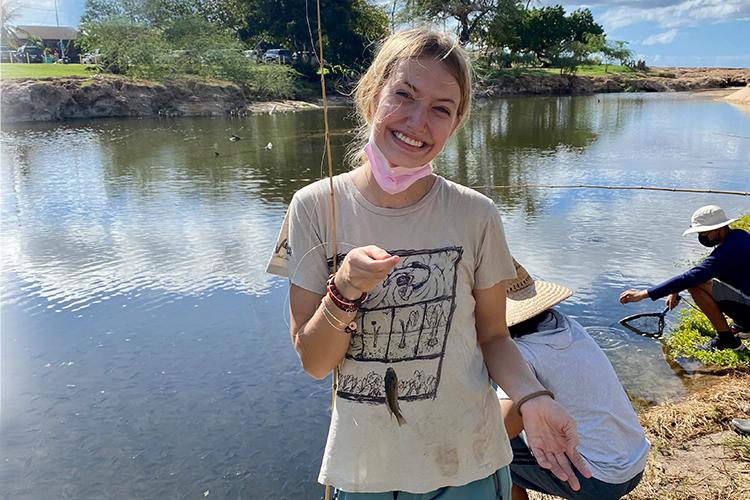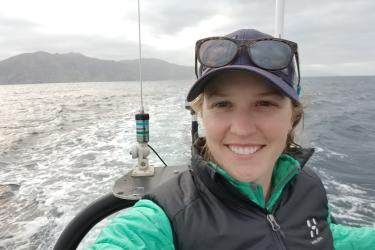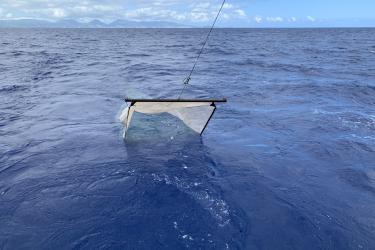Aloha, my name is Andie Le Doux, and I am currently a college intern in the 2022 Hollings Preparation Program (HPP). I am working with the NOAA Fisheries Pacific Islands Regional Office and Conservation International Hawaiʻi on a sustainable fishing and seafood labeling project.
Introduction to the Field
Growing up between Kapolei, Oʻahu, and Ontario, Canada, I’ve spent most of my life in the water swimming, surfing, or fishing. My love for the water and surfing inspired my 8th grade science fair project, which became my first gateway to NOAA. From that project, I got to engage with NOAA scientists and visit the Inouye Regional Center on Oʻahu to present my work at the Imi Wai Ola conference. I knew from that moment that I wanted to study environmental science and do more work with NOAA one day.
I have never lost track of that goal. I spent much of my time in high school gaining experience in native forest and wetland conservation, but I knew I wanted to make my way back to the ocean. The opportunity to expand my knowledge of our oceans here in Hawaiʻi, as well as learn about all the different career fields NOAA has to offer, is what inspired me to take part in the Hollings Preparation Program.
Working to Understand What Sustainable Fishing and Seafood Labeling Means for Hawaiʻi
For my HPP project, I’ve been working with NOAA and Conservation International Hawai‘i to understand sustainable seafood sourcing and labeling in Hawai‘i. This work includes researching corporate commitments to local and sustainable seafood, visiting seafood markets to observe seafood labels, creating consumer surveys, and interviewing experts in the fisheries and aquaculture fields.
This research is important because Hawaiʻi imports the majority of its seafood. Studying consumer preferences; the commitments of grocers, restaurants, and corporations; and insight from professionals in the fishing industry can help us better understand and address the problem of unsustainable, falsely labeled, and imported seafood.
My research began with learning more about the existing third-party certifications for seafood. These certifications on seafood packaging are intended to help consumers determine whether the product came from a well-managed or improving fishery (a fishery working toward sustainability certifications). Many large corporations (hospitality groups, restaurants, grocery stores) have made public commitments to sustainable seafood, but little research exists on how these commitments apply to their operations in Hawaiʻi. I focused much of my project on researching companies' commitments and determining if they are upholding those commitments in Hawaiʻi. I also looked at whether the organizations are using the local seafood Hawaiʻi has to offer.
Despite its public statements, a company’s commitment to sustainability may not be reflected in the marketing seen on menus or in stores. As part of my research, I visited stores and markets to see how their fish is labeled to consumers. This labeling includes the origins of the fish, if it’s fresh or previously frozen, any sustainability certifications, and if it’s harvested locally.
The next stages of my project will involve interviewing professionals in the industry to gather their input. These professionals include fisherman, chefs, Hawaiian loko iʻa (fishpond) practitioners, and seafood market managers.
I will also be creating a survey to understand consumer preferences when buying seafood. This is important as consumers support the seafood industry by purchasing fish. My hope is that the survey will help me better understand what seafood-purchasing consumers care about.
I’ll be compiling and comparing my findings from each stage of research to better understand how NOAA Fisheries can help Hawaiʻi improve its sourcing and labeling of local and sustainable seafood.
The Hollings Preparation Program Intern Experience
The Hollings Preparation Program is truly a multi-faceted and immersive experience for undergraduates who have just completed their freshman year. The program includes students from all over the Pacific—California, Oregon, Washington, and Alaska, in addition to Hawaiʻi. All of these places have their own distinct cultures and ecosystems. The meetings held throughout the week really allow us interns in the program to connect and learn from one another.
The program holds HPP webinars twice a week, where different NOAA scientists from around the country share about their career to expand our knowledge of careers within NOAA. The webinars are also extremely helpful from a networking standpoint. They allow us to interact and connect with scientists in different fields of interest.
There’s also a weekly HPP book club where we come together to discuss the readings we’ve done—and the culture, natural resources, and geography of our homes. We’re also learning "R," a programming language useful for data analysis. This course is practical in preparing for future positions where coding may be necessary.
I look forward to the upcoming portions of my internship, which include touring a NOAA research vessel and presenting my research to HPP peers at the end of the 6 weeks. HPP has been a fulfilling experience for me to learn more about NOAA careers, other Pacific ecosystems, and the implications of seafood sourcing and labeling habits in Hawaiʻi.
Meet the Blogger
Andie Le Doux is a summer 2022 intern with the Hollings Preparation Program. She is from Kapolei, Hawaiʻi, and graduated from Kapolei High School in 2021. Andie currently attends the University of Hawaiʻi at Mānoa, where she majors in Natural Resources and Environmental Management. After receiving her bachelor’s degree, she hopes to attend graduate school and pursue a career in conservation or environmental law.





